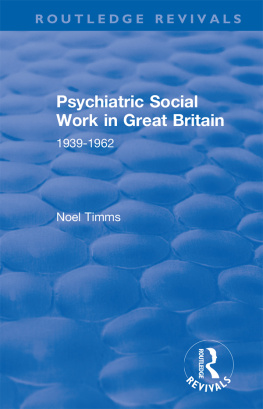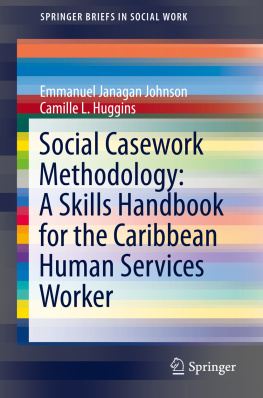Routledge Revivals
Language of Social Casework
Originally published in 1968, Language of Social Casework considers the way in which social workers commonly neglect language. It is suggested that part of this neglect is due to the ways in which social workers and their critics envisage the activity of social work. The traditional criticisms of philanthropy and social work, are, therefore reviewed, and an attempt made to describe some common responses to them on the part of the practitioners. This is followed by an examination of two terms that are of some importance in the language of casework: the generic-specific concept, and the idea of the settings of casework. But casework is also described in terms borrowed from other contexts: it is seen as art or science, as a therapy or the offer of friendship. Each of these descriptions is considered in the last two chapters of the book. The book also includes a brand new and fully updated preface by the author, contextualis-ing this 1968 publication, in light of advancements made in the past 50 years.
First published in 1968
by Routledge & Kegan Paul Ltd
This edition first published in 2018 by Routledge
2 Park Square, Milton Park, Abingdon, Oxon, OX14 4RN
and by Routledge
711 Third Avenue, New York, NY 10017
Routledge is an imprint of the Taylor & Francis Group, an informa business
1968 Noel Timms
All rights reserved. No part of this book may be reprinted or reproduced or utilised in any form or by any electronic, mechanical, or other means, now known or hereafter invented, including photocopying and recording, or in any information storage or retrieval system, without permission in writing from the publishers.
Publishers Note
The publisher has gone to great lengths to ensure the quality of this reprint but points out that some imperfections in the original copies may be apparent.
Disclaimer
The publisher has made every effort to trace copyright holders and welcomes correspondence from those they have been unable to contact.
A Library of Congress record exists under LCCN: 68133752
ISBN 13: 978-1-138-36844-6 (hbk)
ISBN 13: 978-0-429-42922-4 (ebk)
ISBN 13: 978-1-138-36845-3 (pbk)
Towards a History of Social Work
Prologue
This re-issue of the Language of Social Casework serves two purposes. It traces the recent history of social work in general, showing also the part played by language in any conceptualisation of social work. It presents a model for an ever-present concern with the role of language in any consideration of social work. It signals a defeat for the view of some in the Functional School of American Social Casework, to be featured below, that the relationship between social worker and client is so elusive as to be beyond words. Taft acknowledged a resistance to putting in to words living experience, which can never be accurately represented verbally. Ones very fidelity to a scientific standard reacts against the distortion that words inevitably entail, not only in the failure to represent a moving relationship process but in the unpredictable response they elicit from the reader (Taft, 1950, in Robinson, 1962, pp. 325-6).
The controversy between the two American schools, the Diagnostic and the Functional as one of the few articulated disagreements in social work has significance beyond America in helping to make social work intelligible. Unless social work knows something about dealing with people that no other professional group has discovered, unless social work can really bring to bear a skill that outweighs its lack of administrative and business experience, it will not survive the tremendous demands and public scrutiny involved in meeting the large scale needs of today (Taft, 1937, in Robinson, 1962 p.211).
A critical treatment of language is a necessary condition for understanding social work. It is not a sufficient condition. We need also to attend to the action of powerful people as they achieve a significant turn to a unified, single profession of social work and an increasing reliance on psychoanalytic notions. Eileen Younghusband voices the first, Olive Stevenson the second.
Younghusband was less enthusiastic about psychoanalytic ideas as crucial for social work practice than Stevenson, though it will become clear that Stevensons conceptualisation of the contribution above all of Melanie Klein, lacks precision. Younghusband relied more on the range of topics she encountered on her social science course at L.S.E. The deputy head of the Social Science Department, Edith Eckhard was, to my personal recollection, to praise Younghusband for her extensive journalism rather than her scholarship. Olive Stevenson, on the other hand, praised Younghusbands formidable intellect (Stevenson, p.75). Younghusband considered she was not unduly influenced by American social work writers, but, as Stevenson observed, She had close contact with leaders of social work in the United States (Stevenson. P.73). At a time of a sparse British literature on social work, reliance was placed on writers such as Charlotte Towle, whom Younghusband invited to England, Felix P. Biestek, Helen Perlman and Harriet Bartlett (Stevenson, p.73). It seems to have escaped notice that none of these writers were from the Functional School of American Casework. This seems noteworthy in the case of Olive Stevenson who writes positively of the work of Clare Winnicott for two reasons. Firstly, Winnicott connects social work essentially with the functions of major social institutions such as the National Health Services. Secondly, Winnicott supports the elevation of the social workers professional self. Our professional relationships are taken to be the best part of ourselves, but self-talk is of course so varied and manifold that reasons have to be given for settling on any one meaning.
It could be said that the past of social work, briefly to be indicated in what follows, when contrasted with any immediate understanding is indeed another country. The contours and origins of such a country can be discussed in a close analysis of the language used to chart change away from the alarming increases in specialist training (Jones, p.54) for social work, and towards a turn to psychoanalytic understanding of the professional relationship between social worker and client. Stevenson quoted an admired social work teacher. Our professional relationship is in itself the basic technique by means of which we relate ourselves to the individual and to the problem (Stevenson, p.96). In an unspecified way the worker seems almost external to the situation as she achieves a good balance between the use of the intellect and the use of feelings (Stevenson, p.51) as if intellect and emotion were not conceptually linked already.
Emotion and intellect are conceptually and inseparably bound together and this is not appreciated in Stevensons picture of the social worker moving between the inner and outer worlds of the person(s) they are seeking to help
(Stevenson, 2013, p.75). Her view that radical Marxist social work theorists excluded consideration of the inner world (2013, p78) could not be applied in any phenomenological interpretation of Marx. Stevenson herself favours strongly a psychoanalytic orientation to social work, but the extent of this turn away from an integration of psychodynamic and sociological remains unclear.
On the one hand, she writes I have not adopted Kleinian theory in any wholesale way (Stevenson, p.42) but we have no way of grasping any retail use. Her admiration for Wittenberg Salzbergers book on Kleinian theory and social work is unqualified.







